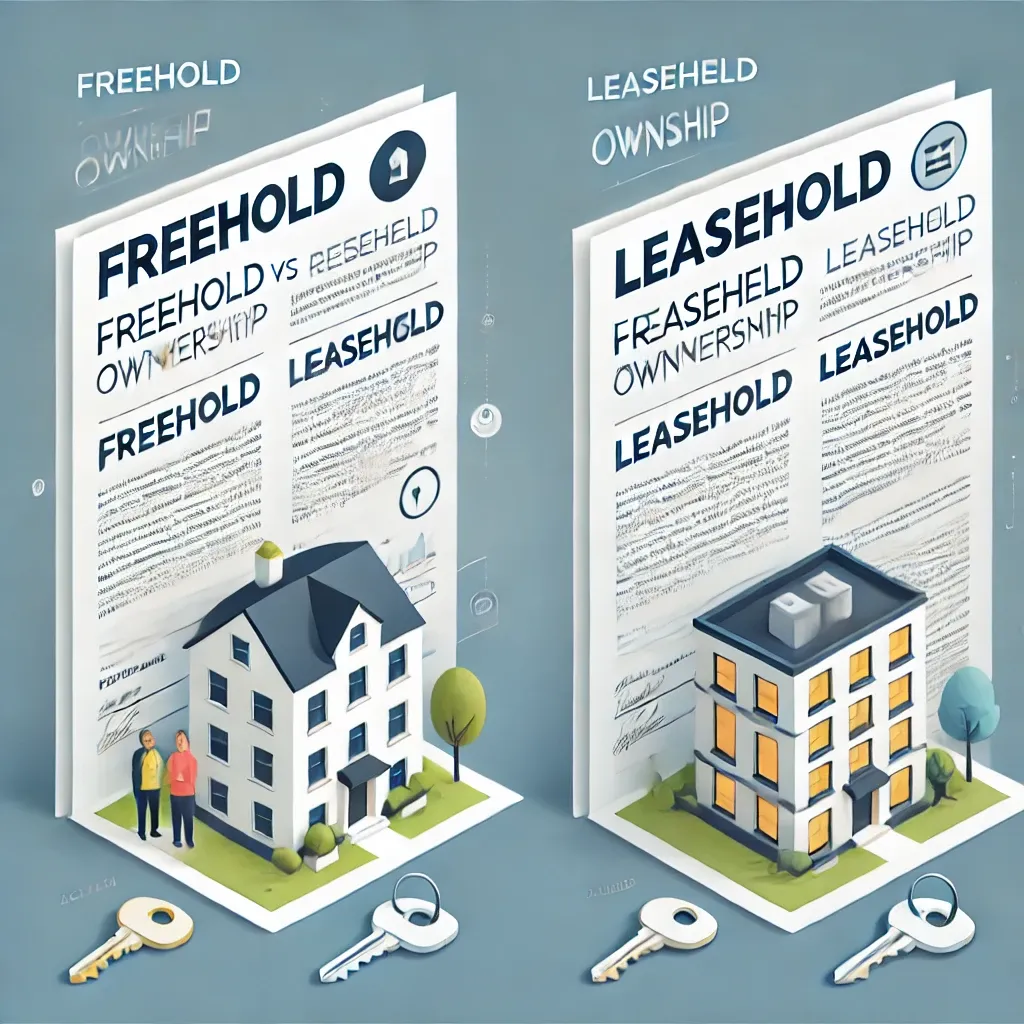Freehold and leasehold: what are their main differences and advantages?

- Freehold or leasehold: which forms of property ownership should you choose?
- What are the differences between freehold and leasehold in international real estate?
The main forms of property ownership in real estate
Freehold and lishold are the two main structures of real estate ownership that have their roots in British law and its former colonies. Freehold (from the English freehold, where "free" means "free" and "hold" means "to hold" or "to own") is the full ownership of real estate that exists in most countries of the world.
A characteristic feature of freehold is that the owner not only owns the building but also the land beneath it, without any time restrictions. This means that they have the opportunity not only to freely manage their property but also to carry out all necessary measures for its maintenance and repair.
What is a leasehold?
Leasehold, in turn, is a form of long-term rental, the term of which can vary, for example, from 99 to 125 years or even longer. In this case, the tenant makes a one-time payment for the entire duration of the lease. It is important to understand that the leaseholder owns only the building itself, while the land rights remain with the owner. Consequently, the leaseholder is required to pay ground rent regularly.
Differences between freehold and leasehold
In real life, the main difference between a freehold and a freehold is that in the case of a freehold there is a landlord in addition to the owner. The landlord can be:
- private individual;
- company;
- local administration;
- real estate developers association.
The rights and obligations for managing property are governed by the terms of the contract between the leaseholder and the landlord. For example, the landlord can sell the leasehold before the lease term ends and is responsible for maintaining the common areas in apartment buildings.
Rights and limitations of the leaseholder
A leaseholder does not always have the ability to sublet their property or make changes without the prior consent of the landlord. However, sometimes they can delegate property management to a specialized company.
Historical context
Drawing a historical trail back to medieval England, one can see that freehold extended to various forms of land ownership, including knights' obligations to fulfill military tasks and peasants' financial obligations to landowners.
The concept of leasehold as a form of land rental began its history in the 13th century and started to actively develop in the late Middle Ages. During this period, feudal lords, having large plots of land at their disposal, began renting them out to both individual tenants and groups.
Modern changes in the field of leasehold.
The legal status of leaseholders remained virtually unchanged until 2002, when the Leasehold Reform and Commonhold Act was passed, introducing new conditions for extending lease terms and purchasing them on freehold terms. This law significantly transformed the real estate market and strengthened the position of leaseholders.
Conclusion
Thus, understanding the differences between freehold and leasehold is an important aspect for anyone interested in real estate, especially in the context of the UK and other countries with similar legal systems. For individuals considering the possibility of buying or renting property, knowledge of these concepts can be extremely useful and timely.
Having a clear understanding of the rights and obligations associated with different forms of ownership will help you avoid legal difficulties and make more-informed decisions regarding the property you are buying or renting.
In international sources, including real estate listings on global platforms, participants in transactions are still referred to as "landowner" and "tenant." However, it is worth noting that the meanings of these terms have undergone significant changes over time. In the modern legal systems of the UK and its former colonies, such as Australia, New Zealand, and Canada, two key categories have emerged: "freehold" and "leasehold." These types of ownership are becoming increasingly sought after in countries like Thailand, the United Arab Emirates, and Malaysia, where foreigners have been granted the opportunity for full ownership of real estate, which was previously limited to long-term leases.
In general, when comparing "freehold" with "leasehold," the former is often more expensive.
9 October 2024
29 January 2025
29 September 2025
29 January 2025
9 October 2024





Sale hotels in Jumeirah Lake Towers with city view 190 600 $

1

2

80

Sale office in Jumeirah Lake Towers 368 000 $

1

127
The process of purchasing real estate with freehold rights
However, buying a freehold property is not always an easy process. In countries such as England and Wales, it is possible to buy freehold houses, while apartments are mostly offered on a freehold basis. In Thailand, foreign buyers have the opportunity to purchase apartments and houses with full ownership rights, but land can usually be leased only on a freehold model. In the United Arab Emirates, the right to purchase real estate with freehold is available only in specialized zones such as Dubai, Abu Dhabi and Sharjah, due to the caution of local authorities in the transfer of land to foreigners.
Available offers in the Dubai real estate market
The real estate market in Dubai currently has 847 listings with prices starting from $145,000. For example, in the center of the Motor City area, you can find investment apartments with a guaranteed yield of 9% per year, with completion planned for 2025. There are also new apartments in the quality complex Central Downtown in the Arjan area, which offer the possibility of obtaining a visa and a yield of 8.2%, with an expected completion date in 2026.
Luxury projects
- Project ErinA unique apartment with a yield of up to 7.5%, covering an area of 121 square meters and priced from $588,000.
- Franck Muller complex: high-rise residential complex with designer finishes, delivery is planned in 2027.
- Armani Beach Residences: private beach and pools at Palm Jumeirah, starting price from $6,262,000, completion date 2026.
- Eywa ResidenceLocated on the banks of the canal, with recreational areas, pools, and waterfalls, completion is set for 2026, with a minimum price of $2,771,000.
- Cello Luxury Residence: with swimming pools, located in the prestigious JVC area, scheduled for completion in 2027, prices start at $270,000.

Conclusion
In conclusion, it is worth noting that the question of choosing between freehold and leasehold remains relevant for many real estate buyers, especially in the current market conditions. As the author of this material, I have tried to thoroughly examine the historical aspects, legal features, and modern trends in property ownership in various countries.
Freehold offers full control of the property, which certainly meets the requirements of many buyers seeking a long-term investment. However, the high cost of such properties can prove to be a significant barrier to many willing buyers. Lienhold, on the other hand, while implying a number of restrictions and dependencies on landlords, offers the possibility of a more affordable entry into the real estate market and has its advantages, especially in emerging economies.
Key aspects of choosing between Freehold and Leasehold:
- Freeholdfull control at a high cost.
- LickholdAvailability, but with limitations.
In addition, it is worth noting that understanding these two forms of real estate ownership is extremely important for foreign investors who face different legislative nuances in different countries. The development of the real estate market in regions such as Southeast Asia and the Middle East provides new opportunities for investment activities, while remaining under the influence of the established concepts of freehold and leasehold.
Proposals for foreign investors:
- Studying local laws and regulations.
- Analyze the market and existing offerings.
- Lickhold and freehold risk assessment.
Finally, I hope that this analysis will help readers gain a deeper understanding of the differences between these forms of ownership and make an informed choice when purchasing real estate. In the context of globalization and constantly changing economic conditions, it is important to stay updated on the latest trends and legislative changes in order to manage your investment portfolio as effectively as possible.
Tags
Comment
Popular Posts
9 October 2024
1505
29 September 2025
459
29 January 2025
1583
9 October 2024
9978
Popular Offers

Subscribe to the newsletter from Hatamatata.com!
Subscribe to the newsletter from Hatamatata.com!
I agree to the processing of personal data and confidentiality rules of Hatamatata





